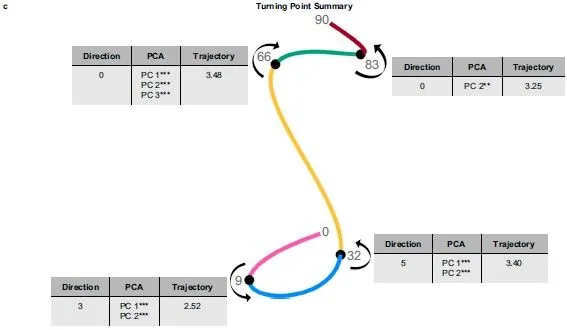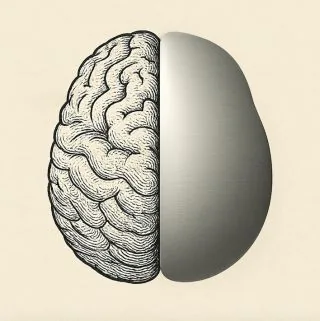As we navigate the complexities of life, many of us occasionally find ourselves grappling with a misplaced word, a forgotten detail, or a moment of mental fog. These aren't just isolated incidents; they can be early signals of how our diet and age influence thinking and cognitive function. The good news? It's never too late to take control of your brain health.
This guide from Routinova will illuminate the intricate connections between your dietary choices, the natural aging process, and your cognitive abilities. We'll explore the scientific mechanisms at play and provide practical, actionable strategies to help you maintain a sharp, focused mind for years to come.
What You'll Learn:
- The profound impact of diet and aging on your brain's health and function.
- Key scientific mechanisms, including inflammation and hormonal imbalances, that link obesity to cognitive decline.
- Actionable dietary strategies to protect and enhance your mental clarity.
- Complementary lifestyle habits that support optimal brain health.
- When and how to seek professional guidance for personalized support.
Prerequisites:
To embark on this journey toward a sharper mind, all you need is an open mind and a willingness to explore new habits for better well-being.
1. The Mind-Body Connection: How Diet & Age Influence Thinking
At its core, the question of how diet influence thinking is about the fuel and maintenance we provide our most complex organ. Our brains, while remarkably resilient, are not immune to the wear and tear of time or the impact of what we consume. As we age, it's common to experience subtle shifts in cognitive function, such as reduced processing speed or occasional memory lapses.
However, accumulating scientific evidence strongly suggests that chronic obesity, especially when long-standing, significantly impairs cognitive function and accelerates brain aging. This isn't just about feeling a bit forgetful; it can manifest as mind-wandering, confusion, and a reduced ability to organize and focus thoughts. These are early symptoms that, if unaddressed, can contribute to more serious conditions like dementia. The choices we make daily about food profoundly impact our brain's future.
2. Understanding the Silent Threats: Inflammation and Excess Weight
One of the most critical ways your diet influence thinking is through its impact on inflammation. When you carry too many fat cells, particularly visceral fat around your organs, it triggers a state of chronic, low-grade, body-wide inflammation. This isn't the acute inflammation you experience after an injury; it's a persistent, simmering process that silently damages tissues throughout your body, including your brain.
Inflammation in the brain is a recognized underlying factor in both normal brain aging and the development of dementia. Researchers worldwide, including those at Harvard Health, consistently document how this chronic inflammatory state, fueled by excessive body fat, directly impairs the function of the aging brain. Limiting processed foods, refined sugars, and unhealthy fats is crucial for dampening this inflammatory response and protecting your cognitive health.
3. Leptin's Double-Edged Sword: A Hormonal Link to Brain Health
Beyond inflammation, excess body fat actively impairs brain function through elevated levels of a fat-derived protein called leptin. Leptin is a hormone primarily involved in regulating glucose, fat, and energy metabolism. While it plays a vital role in signaling satiety, chronically high levels due to obesity can have detrimental effects.
Leptin has the ability to cross the blood-brain barrier, and once inside, it may impair brain function. A significant study involving 669 individuals over the age of 65 reported that higher blood levels of leptin were significantly associated with a greater likelihood of experiencing cognitive impairment (Feinkohl et al., 2020). This highlights another complex mechanism by which our diet influence thinking, specifically through hormonal pathways that affect neural activity and communication.
4. The Vascular Highway: How Blood Flow Impacts Cognitive Function
The health of your brain's blood vessels is paramount for optimal cognitive function. Obesity can lead to pathological changes in the small blood vessels within the brain, including impaired endothelial function and a disrupted blood-brain barrier (Balasubramanian et al., 2021). These changes compromise the brain's ability to receive essential nutrients and oxygen, and to clear waste products.
Another condition often associated with obesity is chronic venous insufficiency (CVI), primarily known for physical symptoms like leg swelling. Emerging research, including insights from Stanford Medicine, indicates that CVI, particularly due to cerebral venous congestion, can impair cognitive functions such as executive function, processing speed, and attention. Imagine trying to solve a complex problem or remember where you parked your car when your brain isn't getting adequate blood flow—this is a tangible example of how diet influence thinking by affecting the brain's delicate vascular network.
5. Nourishing Your Brain: Practical Dietary Strategies
It's empowering to know that you can positively impact brain aging by losing weight and adopting healthier eating habits. Here are actionable strategies to optimize your diet influence thinking:
- Embrace the Mediterranean Diet: This eating pattern, rich in fruits, vegetables, whole grains, legumes, nuts, seeds, and olive oil, has consistently been linked to better cognitive health. It emphasizes lean proteins like fish, which are excellent sources of omega-3 fatty acids, crucial for brain cell structure and function.
- Prioritize Whole, Unprocessed Foods: Focus on foods in their most natural state. Minimize intake of ultra-processed foods, sugary drinks, and refined carbohydrates, which contribute to inflammation and insulin resistance—both detrimental to brain health. A simple swap from white bread to whole-grain bread can make a difference.
- Boost Antioxidant Intake: Colorful fruits and vegetables like berries, leafy greens, and dark chocolate are packed with antioxidants. These compounds help combat oxidative stress, a process that can damage brain cells and accelerate aging. Think of them as tiny shields protecting your neurons.
- Stay Hydrated: Water is essential for every bodily function, including brain performance. Even mild dehydration can lead to reduced concentration, fatigue, and headaches. Aim for at least 8 glasses of water daily.
- Smart Snacking: Choose brain-friendly snacks like a handful of almonds, an apple with peanut butter, or Greek yogurt. These provide sustained energy and essential nutrients without the sugar crash.
Pro Tip: Instead of drastic overhauls, start with small, sustainable changes. Replace one sugary drink with water daily, or add an extra serving of vegetables to your dinner.
6. Beyond the Plate: Lifestyle Habits for Cognitive Resilience
While how diet influence thinking is a primary focus, a holistic approach to brain health includes several complementary lifestyle factors:
- Regular Physical Activity: Exercise increases blood flow to the brain, stimulates the growth of new brain cells, and reduces inflammation. Aim for at least 150 minutes of moderate-intensity exercise per week, such as brisk walking, swimming, or cycling.
- Quality Sleep: During sleep, your brain clears out metabolic waste products and consolidates memories. Chronic sleep deprivation can impair cognitive function and increase the risk of neurological disorders. Prioritize 7-9 hours of quality sleep per night.
- Stress Management: Chronic stress can damage brain cells and impair memory. Incorporate stress-reducing techniques like meditation, yoga, deep breathing exercises, or spending time in nature. Managing stress is key to how your diet impacts cognitive abilities.
- Mental Stimulation: Keep your brain active by learning new skills, solving puzzles, reading, or engaging in intellectually stimulating conversations. Lifelong learning helps build cognitive reserve, making your brain more resilient to age-related changes.
- Social Connection: Strong social ties are associated with better cognitive function and a lower risk of dementia. Engage with friends, family, and community to foster a sense of belonging and purpose.
7. Common Questions About Diet and Brain Health
Many people have questions about how their diet influence thinking and what they can do right now. Here are some frequently asked questions:
Can losing weight reverse cognitive decline?
- While not a guaranteed reversal for all conditions, losing weight, especially if you are overweight or obese, can significantly improve various markers of brain health and slow cognitive decline. It's never too late to make a positive impact on brain aging by shedding excess pounds and adopting a healthier lifestyle.
What specific foods are best for memory?
- Foods rich in omega-3 fatty acids (fatty fish like salmon, walnuts, flaxseeds), antioxidants (berries, dark leafy greens), and B vitamins (whole grains, eggs) are particularly beneficial for memory and overall brain function. The MIND diet, a hybrid of the Mediterranean and DASH diets, specifically targets brain health.
How quickly can diet influence thinking?
- The brain is incredibly adaptable. While significant long-term changes take time, some people report feeling more mentally clear and focused within a few weeks of adopting a healthier diet. The consistent reduction of inflammatory foods and increase of nutrient-dense options can lead to noticeable improvements in energy levels and cognitive sharpness over months.
Does diet affect brain function immediately?
- Yes, to some extent. For example, a high-sugar meal can lead to a








